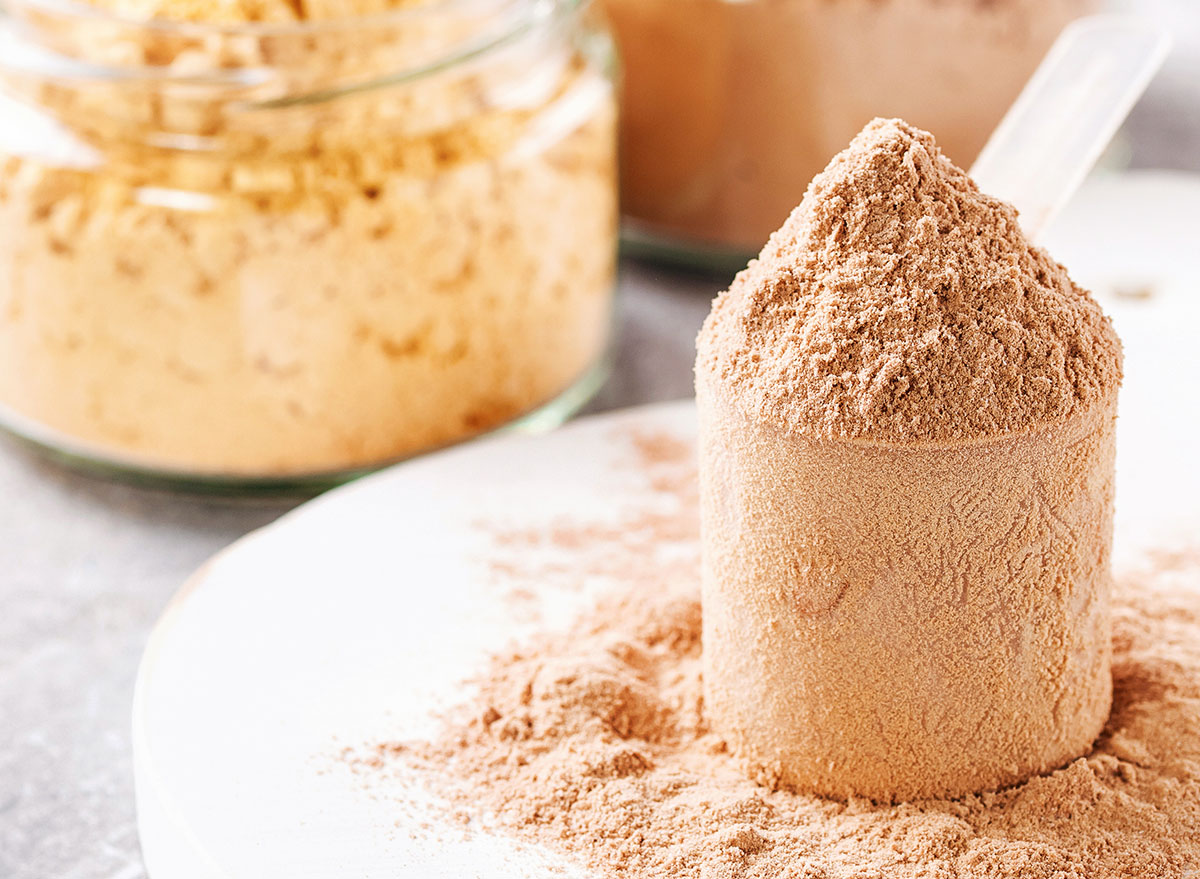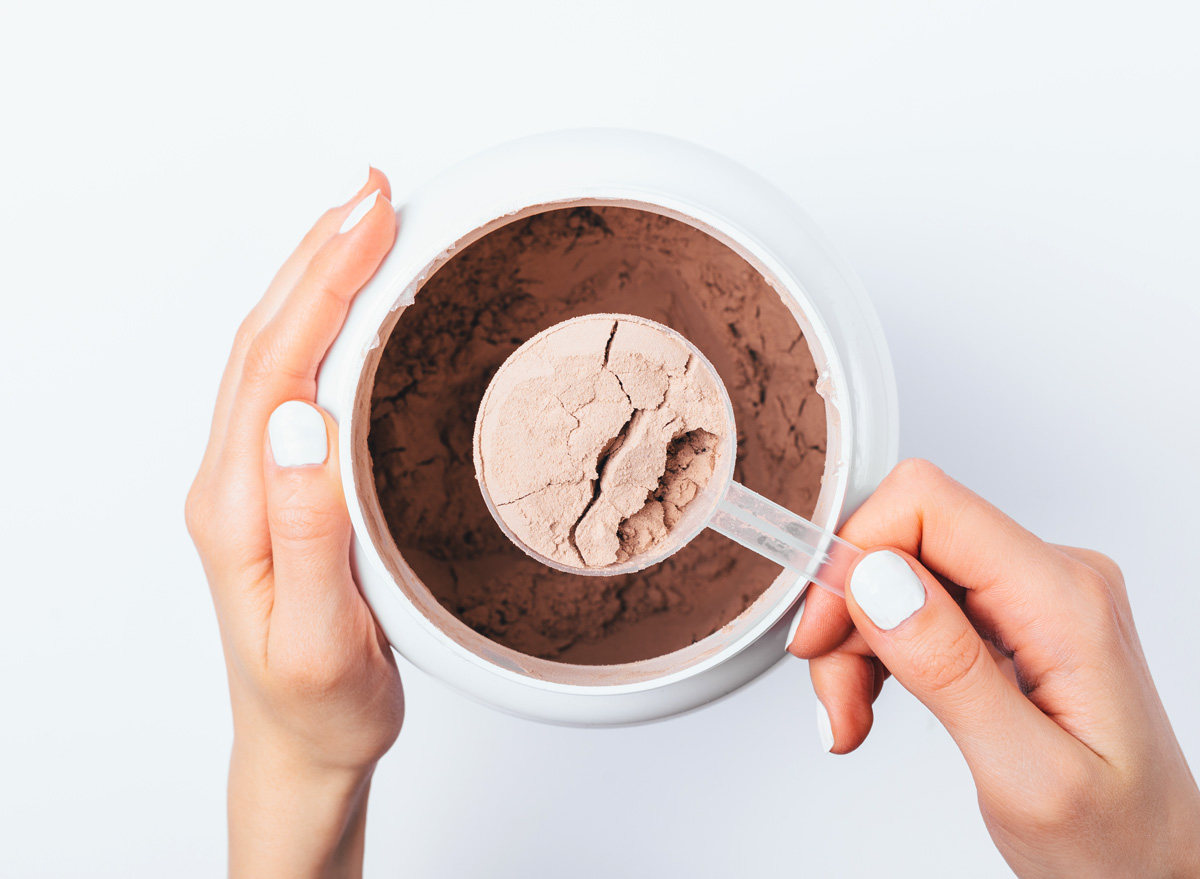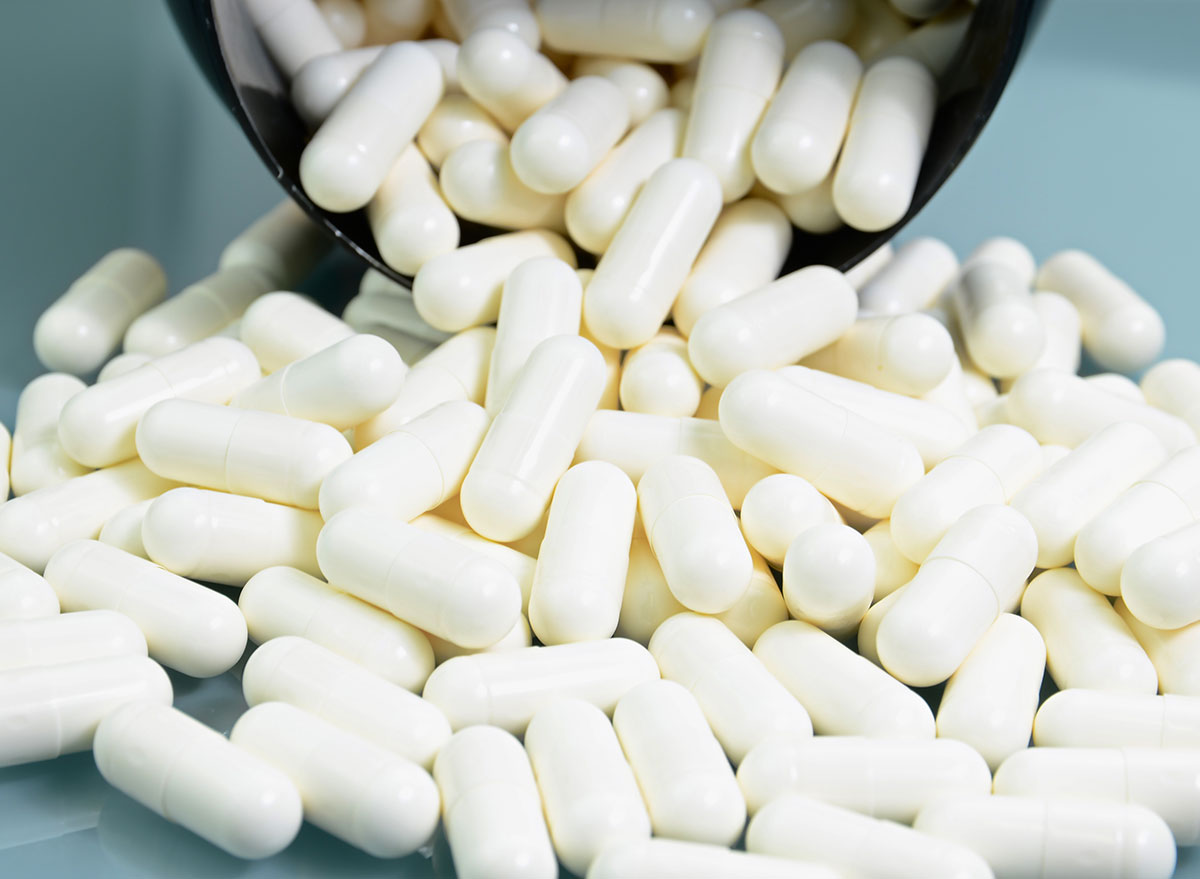The #1 Best Supplement for Building Muscle, Says Science

If you want to build muscle as hard as a brick, start thinking of your skeleton as the frame of a house. Your muscle is the wall you want to build on that frame and protein is the brick and mortar. In other words, when it comes to building muscle, protein is an essential part of the blueprint. So it should come as no surprise that the best supplement to build muscle, as supported by science and recommended by nutritionists, is protein powder.
"I strongly recommend supplementing with protein powder for repairing and rebuilding muscle stronger than they were before," says certified sports nutritionist Hope Prenner, a National Academy of Sports Medicine Certified Personal Trainer and a Certified Sports Nutritionist on staff at BucketListTummy.com.
Before we get to why protein powder is the best supplement for that brick and mortar, let's learn a bit about how muscle is built.
The role protein plays in muscle building.
When you eat protein (meat, fish, dairy products, beans), digestion turns that protein into amino acids that are absorbed into your bloodstream through your gut and transported to your skeletal tissues where they are built into muscle. The process is called muscle protein synthesis. Those amino acids are the "bricks" that make up your wall of muscle. You don't have to eat bricks to get those aminos: Here are 25 Perfect Muscle-Building Foods.
Before we continue, it's worth noting that bigger muscles and greater strength don't just happen from eating protein alone. You do still need to stress your muscles, and resistance exercise encourages muscle growth by breaking down muscle tissue so those protein amino acids can "build back better," to use a popular pronouncement.
READ ON: Build Muscle and Get Lean with This 4-Move At-Home Workout.
Why protein powder is the best supplement for building muscle.

If you're looking to build muscle, you're not (or shouldn't be) sedentary. You need to work out, probably vigorously, with weights. Depending on your physical size, age, health, activity level, and goals, you'll likely need more protein than what the average American consumes.
For context, The Dietary Reference Intake—the recommended amount of protein per day—is 0.36 grams of protein per pound of body weight. It's easy for a 160-pound American to get 57 grams of protein from his or her food in a day. That's the bare minimum recommended for a sedentary person to avoid a protein deficiency.
Those numbers get much higher for people who want to build muscle.
Based on some clinical studies, the general guideline has been to consume 1 gram of protein (or slightly more) per pound of bodyweight to gain or maintain muscle. That works out to be about 160 grams for a 160-pound person, a good deal more than the DRI's suggested 57 grams for the same size person.
If you ate 2 eggs, 1 cup of yogurt, 2 glasses of whole milk, a chicken salad sandwich, 2 servings of string cheese, and 5 ounces of grilled salmon in a day, you'd tally about 124 grams of protein, still 46 grams shy of the optimum amount needed to build muscle.
That's why protein powder is considered by most exercise physiologists and sports nutritionists to be the best supplement to take for building muscle.
Mixed in a beverage, a concentrated dose of protein is an easy way to increase your daily grams.
What is the best type of protein powder?
Choosing a protein powder can make your head spin. (That's why we have this guide to The Best Protein Powders to Buy). There are dozens and dozens of different types, including whey protein, casein protein, egg protein, and all sorts of plant-based protein powders, like pea and soy.
For the greatest muscle bang for your buck, choose whey protein because of its rich amino acid content, says registered dietitian nutritionist Lauren Manaker, MS, LD, member of the Eat This, Not That! Medical Expert Board.
A number of studies including one in the Journal of Applied Physiology comparing whey, casein, and soy proteins, found that muscle protein synthesis stimulation was much greater in resistance exercisers after they consumed a whey protein drink.
Then there's this, a meta-analysis of data from 49 studies published by McMaster University kinesiologists in the British Journal of Sports Medicine in 2017. The researchers reviewed measured changes in strength and muscle tissue in resistance exercise trainers over time and found that protein supplementation significantly increased participants' one-repetition maximum lift and muscle size gains.
RELATED: 9 Best Whey Protein Powders, According to Dieitians
Get an extra muscle-building boost from creatine.

For an added boost, Prenner suggests also taking creatine monohydrate supplements. Creatine, naturally found in muscle cells, helps the body make adenosine triphosphate (ATP), a substance that fuels muscle contractions for explosive bursts of strength. Research suggests that creatine will help you work out harder before becoming fatigued.
Creatine supplements, which come in powder, capsule, and tablet form, also may boost muscle mass and speed up recovery after intense workouts. If you'd prefer to recover with food instead of popping a pill, try one of these 12 Best Recovery Fuels for Every Workout.
For more healthy eating news, make sure to sign up for our newsletter!
Read this next:
- Eating This Food Can Increase Your Muscle Strength by 11%, New Study Says
- The Best Supplements to Take When Exercising for Weight Loss
- Exercise Tricks for Slimming Down Your Body, Say Experts








